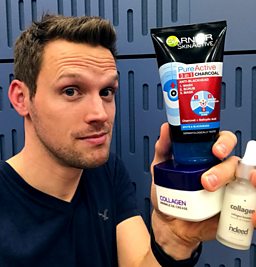Skincare products: Do the claims stand up to scientific scrutiny?
Skincare products are big business – from “anti-ageing” moisturisers to “pore-cleansing” face masks. But amid all the hype it can be hard to know which scientific claims stack up, and which are just slick marketing.
In the first episode of new science show The Best Thing Since Sliced Bread? Greg Foot and his guests puts some popular skincare products in the spotlight.
Can collagen cream and vitamin C really make you look younger? And is activated charcoal the pore-purifying wonder substance it’s made out to be? Read on to find out...

-
![]()
Podcast: The Best Thing Since Sliced Bread?
Greg Foot and his guests look for the facts behind the product fads.


1. Collagen creams
What are the products?
With loads of collagen-based creams out there, Greg chose two to test out: L’Oreal Paris Collagen Wrinkle Decrease Cream and Indeed Laboratories Collagen Booster.
As we get older, the collagen in our skin becomes weaker, which is what gives us wrinkles.
Why use them?
Cosmetics companies talk a lot about collagen, but what actually is it? Well, as Cambridge University chemist Prof Melinda Duer explains, collagen is “essential for giving our tissues their structure. So the dermal layer of your skin – most of it – is this substance, collagen, and the other proteins around it.”
As we get older, the collagen in our skin decreases in amount and quality, which contributes to wrinkles. Some of this change is caused by ageing, but about 80% is down to external factors, such as damage caused by ultraviolet (UV) radiation from the sun.
Collagen isn’t the only factor in skin ageing, but it is hugely important. That’s why creams like these two from L’Oreal and Indeed Laboratories offer to boost or improve the collagen in our skin, and so make us look more youthful.
But do they work?
Good question! The L’Oreal cream claims to contain “collagen biospheres”. Apart from sounding like something from a superhero movie, it’s not clear what these are – they’re not listed in the ingredients, and L’Oreal didn’t respond to a request for more information.
The Indeed Laboratories product contains a chemical called Matrixyl Synthe 6, designed to mimic the molecules in our cells that tell them to produce collagen. The company says a clinical study in humans has shown that Matrixyl Synthe 6 can reduce wrinkle volume “by anywhere between 31 and 100%”. But consultant dermatologist Dr Emma Wedgeworth urges caution when interpreting results like these, since many moisturisers simply boost the water content of the outer layer of the skin to improve the appearance of wrinkles. To truly assess the cream’s effectiveness we’d need to know if Matrixyl Synthe 6 can get through the outer layer of our skin and down to the deeper level where it needs to work.
So, are they worth trying?
We just don’t know. The Indeed Laboratories cream has a stronger scientific basis than many other anti-ageing products, but experiments don’t appear to have been done yet in people to prove that its key ingredient actually reaches the layer of skin where collagen production happens.
-
![]()
Skincare: Collagen
Beauty blogger Rebecca Humphries joins Greg Foot to test collagen face creams.

2. Vitamin C creams
Why use vitamin C creams?
Vitamin C is essential to cell health (without it, you’d get scurvy!), and your skin needs it to produce collagen. It’s also a powerful antioxidant, which means it can potentially neutralise “chemical radicals” created by UV radiation that damage our skin. But to get this protection we need enough vitamin C to reach our skin cells, and it’s thought that we can’t get this through diet alone – that’s why cosmetic companies put it in their products.
Vitamin C is one of the most effective ways to protect your skin.
But do they work?
Yes… potentially. For vitamin C to get through the outer layer of our skin and down to the dermis, where collagen is produced, creams need to be formulated in a particular way. According to Dr Wedgeworth and Prof Duer, scientific studies suggest that to be effective these creams should use a concentration of 10-20% vitamin C, be sold in a light-proof container, and have an acidic pH of less than 3.
So, are they worth trying?
Yes, when combined with a good sunscreen, vitamin C is one of the most effective ways to protect your skin. But while it can help improve skin texture, don’t expect it to remove your wrinkles – it’s about prevention rather than cure and avoiding sun damage in the first place is by far the best approach.

3. Activated charcoal
What’s the product?
Origins Clear Improvement Active Charcoal Mask to Clear Pores.
Activated charcoal is being used for everything from shampoo to hangover cures.
Why use it?
Right now, the much-hyped substance – activated charcoal – is being used for everything from shampoo to hangover cures. As for the Origins face mask, it claims to cleanse the skin using charcoal “like a magnet to draw out deep-dwelling pore cloggers”.
Activated charcoal starts out as standard charcoal (wood or bamboo or coconut shells heated to high temperatures without oxygen) before being treated to erode it’s internal structure. This “activated” substance contains countless tiny holes that could possibly trap molecules of fat and dirt – meaning that in theory it can help cleanse the skin.
But does it work?
The big problem with charcoal-based cosmetics is that it’s often unclear whether they’ve been through the activation process or not, because they don’t legally have to state it on the label.
So, the Origins product calls itself an “active charcoal mask”, but we can’t be sure that it actually contains this purified, “activated” form of charcoal – and the company didn’t respond to a request for information. Even with activated charcoal, although it may improve the surface of our skin, Dr Wedgeworth says, “Nothing is reaching right into that pore and grabbing things out.”
So, is it worth trying?
Perhaps, but it could only have a superficial effect. What you wash your face with can make a big difference to the surface of your skin, but activated charcoal won’t draw impurities out from within your pores, or help with deeper skin conditions such as acne.
The information contained in this article was correct at the time of broadcast on 6 February, 2019.
Listen to the podcast to hear more activated charcoal products being tested.
-
![]()
Skincare: Activated charcoal
Does active charcoal purify pores? Greg Foot and beauty blogger Rebecca Humphries find out.







